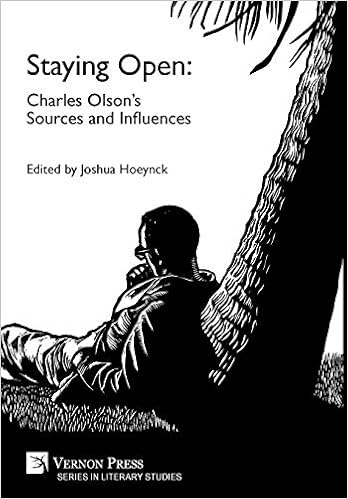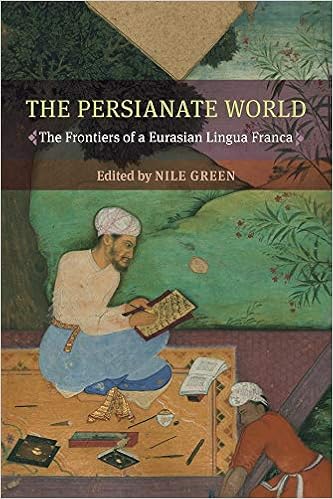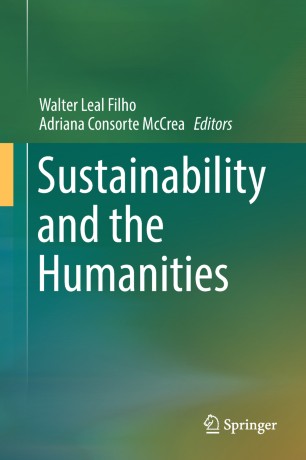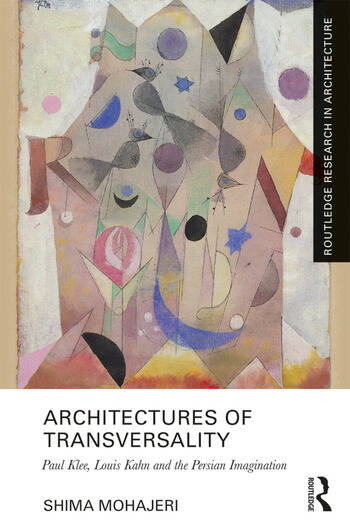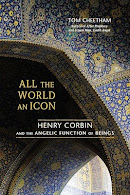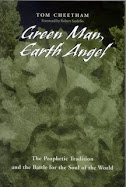"...the Imagination (or love, or sympathy, or any other sentiment) induces knowledge, and knowledge of an 'object' which is proper to it..."
Henry Corbin (1903-1978) was a scholar, philosopher and theologian. He was a champion of the transformative power of the Imagination and of the transcendent reality of the individual in a world threatened by totalitarianisms of all kinds. One of the 20th century’s most prolific scholars of Islamic mysticism, Corbin was Professor of Islam & Islamic Philosophy at the Sorbonne in Paris and at the University of Teheran. He was a major figure at the Eranos Conferences in Switzerland. He introduced the concept of the mundus imaginalis into contemporary thought. His work has provided a foundation for archetypal psychology as developed by James Hillman and influenced countless poets and artists worldwide. But Corbin’s central project was to provide a framework for understanding the unity of the religions of the Book: Judaism, Christianity and Islam. His great work Alone with the Alone: Creative Imagination in the Sufism of Ibn ‘Arabi is a classic initiatory text of visionary spirituality that transcends the tragic divisions among the three great monotheisms. Corbin’s life was devoted to the struggle to free the religious imagination from fundamentalisms of every kind. His work marks a watershed in our understanding of the religions of the West and makes a profound contribution to the study of the place of the imagination in human life.Search The Legacy of Henry Corbin: Over 800 Posts
Saturday, December 22, 2018
Trifecta! Corbin / Twombly / Olson
Staying Open: Charles Olson’s Sources and Influences
Joshua S. Hoeynck (Ed.)
Acknowledgements
Introduction
Chapter 1 Projective Verse and pedagogy
Michael Kindellan
Chapter 2 Olson’s poetics and pedagogy: influences at Black Mountain College
Jeff Gardiner
Chapter 3 Olson’s Dérive, near-far Boulez
Michael Jonik
Chapter 4 “By ear, he sd.”: open listening with Charles Olson and John Cage
Alexander Ruggeri
Chapter 5 “Mu-sick, mu-sick, mu-sick”: Olson’s stammer and the poetics of noise
Seth Johnson Forrest
Chapter 6 Shadow on the rock: morphology and voice in Olson’s later Maximus poems
Jeff Davis
Chapter 7 Charles Olson and his “post-modern” exploration
Joshua Gardner
Chapter 8 “what insides are”: history—gravitational and unrelieved
Kirsty Singer
Chapter 9 Revising the stance of “Projective Verse”: Charles Olson’s ecological vision of Alfred North Whitehead’s cosmology
Joshua Hoeynck
Chapter 10 Olson, Peirce, Whitehead, and American process poetics
Daniel D. Fineman
Chapter 11 Maximus and Aboriginal Australia: antipodean influences on the archaic proprioceptive epic
Nathanael Pree
Chapter 12 An Archaeologist of Morning in the Mayab, 1951
Dylan Clark
Coda
Index
Tuesday, December 18, 2018
The Persianate World
Green, Nile. [Ed.]
The Persianate World: The Frontiers of a Eurasian Lingua Franca.
University of Californai Press,
2019.
"Persian is one of the great lingua francas of world history. Yet despite its recognition as a shared language across the Islamic world and beyond, its scope, impact and mechanisms remain underexplored. A world historical inquiry into pre-modern cosmopolitanism, The Persianate World traces the reach and limits of Persian as a Eurasian language in a comprehensive survey of its geographical, literary, and social frontiers. From Siberia to Southeast Asia, and between London and Beijing, this book shows how Persian gained, maintained, and finally surrendered its status to imperial and vernacular competitors. Capturing the Persianate as process, fourteen essays trace Persian's interactions with Bengali, Chinese, Turkic, and Punjabi, to identify the forces that extended 'Persographia,' the domain of written Persian. Spanning the ages' expansion and contraction, The Persianate World offers a critical survey of both the supports and constraints of one of history's key languages of global exchange"
The Persianate world. Rethinking a shared sphere.
Abbas Amanat; Assef Ashraf [Eds.]
Leiden : Brill 2018.
Iran studies, 18.
"The Persianate World: Rethinking a Shared Sphere is among the first books to explore the pre-modern and early modern historical ties among such diverse regions as Anatolia, the Iranian plateau, Central Asia, Western Xinjiang, the Indian subcontinent, and southeast Asia, as well as the circumstances that reoriented these regions and helped break up the Persianate ecumene in modern times. Essays explore the modalities of Persianate culture, the defining features of the Persianate cosmopolis, religious practice and networks, the diffusion of literature across space, subaltern social groups, and the impact of technological advances on language. Taken together, the essays reflect the current scholarship in Persianate studies, and offer pathways for future research."
Sunday, December 16, 2018
Tom Cheetham - Upcoming Events
February 15, 2019
The Flame of Things
Lessons in Pyrotechnics
Lexington Community Education
Lexington, Massachusetts
REGISTER
April 26 & 27, 2019
The Spirit of Fire and the Missing Yellow:
Imagination & the Lumen Natura
C.G. Jung Society of Montreal,
Montreal, Quebec
September 13-15, 2019
The Rowe Center
Rowe, Massachusetts
Attending to Earth
An Approach to a Psychoecology
Monday, December 10, 2018
New from Mohammad Rustom
THIS IS A REALLY INTERESTING INTERVIEW:
Neo-Orientalism and the Study of Islamic Philosophy:
An Interview with Professor Mohammed Rustom
Mohammed Rustom and Soroosh Shahriari
Journal of Islamic and Muslim Studies,
Vol. 3, No. 1 (May 2018), pp. 112-119
After attending Professor Rustom's advanced seminar on Ibn Sina at Carleton University in winter 2017, doctoral candidate Soroosh Shahriari of McGill University, Canada, "brought up the possibility of. .. [posing] some 'hard' questions concerning the contemporary study of Islamic philosophy." Rustom's in-depth knowledge of the method and spirit of traditional Islamic education and Islamic metaphysics helps us navigate the complexities inherent in the study of Islamic philosophy in the modern academy.
ʿAyn al-Quḍāt between Divine Jealousy and Political Intrigue
Journal of Sufi Studies 7 (2018) 47–73
Mohammed Rustom
Carleton University (Canada)
mrustom@connect.carleton.ca
Abstract Modern scholars have been interested in the great Persian Sufi martyr ʿAyn al-Quḍāt Hamadānī (d. 525/1131) for over six decades. Despite this fact, many aspects of his life and thought still remain terra incognita. Our knowledge of the circumstances sur-rounding his death is a case-in-point. Although we have a fairly good understanding of the factors which led to ʿAyn al-Quḍāt’s demise, there are other “causes” which simul-taneously complement and problematize this understanding. Chief amongst these are the underlying reasons for ʿAyn al-Quḍāt’s critique of the Seljuk government, as well as something which ʿAyn al-Quḍāt saw as a more subtle cause for his death several years before his anticipated state execution.
Sunday, December 9, 2018
Corbin Course Deadline
Register by December 20 to guarantee your place.
tcheetham@gmail.com
Henry Corbin - Turkey, 1942
All the World an Icon
An Introduction to the Thought of Henry Corbin
An Online Course with Tom Cheetham
We meet once a week for 8 weeks in either of two sections:
Section 1: Tuesdays 2:30pm EST [7:30pm GMT] !
Begins January 8, 2019
- for those in Europe -
Section 2: Wednesdays 7pm EST [12am GMT] !
Begins January 9, 2019
- for those in W. Hemisphere -
Register or inquire about details by contacting me directly:
tcheetham@gmail.com
Tuition: $50 per 90-minute live class session. $400 for the course.
*Sliding scale: No one will be turned away because of inability to pay.*
Tuesday, December 4, 2018
Tafsir as Mystical Experience: Intimacy and Ecstasy in Quran Commentary
"The Orientalist" - A Documentary About Henry Corbin!!!!!
From the Tehran Times
Orientalist Henry Corbin subject of “The Eastern” director’s new film
December 2, 2018
TEHRAN – Masud Taheri, the Iranian director of the documentary film “The Eastern” about Japanese expert on Islam Toshihiko Izutsu, plans to make his new film on French philosopher, theologian and Orientalist Henry Corbin (1903-1978).
The film entitled “The Orientalist” will be co-produced by the Documentary and Experimental Film Center and Chehrdad Film, Taheri said in a press release on Saturday.
“The documentary is typically a sequel to ‘The Eastern’ and will focus on the thoughts of Henry Corbin who, like Izutsu, was tracking illumination in the East,” he added.
“Iran was the common ground between the two philosophers who came together in the country before the victory of the Islamic Revolution for most of the months of a year to discuss various issues,” he stated.
Shooting of the documentary will begin in the near future and is expected to be completed in late spring.
Joan Copjec on Corbin & Schelling and more!
Cloud, Precinct of the Theological-Historical
Joan Copjec
Psychoanalysis and History, Volume 20 Issue 3, Page 277-291,
ISSN 1460-8235
Available Online Nov 2018
Keywords: imaginal world, Cloud, tautegory, expression, Corbin, Lacan, Laplanche, Freud, Schelling, abyss, Abgrund, après-coup, Nachträglichkeit, tautegory
(https://doi.org/10.3366/pah.2018.0269)
Abstract
Regarded by many as the pre-eminent Islamicist of the twentieth century, Henry Corbin is also the subject of much criticism, aimed primarily at his supposed overemphasis on the mythological aspects of Islamic philosophy and his idiosyncratic privileging of the concept of the imaginal world. Taking seriously an unusual claim made by Steven Wasserstrom in Religion after Religion that the redeployment of Schelling's concept of tautegory by Corbin reveals all that is wrong with his work, this essay seeks to defend both the concept and Corbin's use of it. Developed by Schelling in his late work on mythology, the concept of tautegory turns out to be, for historical and theoretical reasons, a revelatory switch point. Not only does it make clear why the imaginal ‘locus’ is key to understanding the unity of God – the oneness of his apophatic and revealed dimensions – it also gives us profound insights into the links connecting Islamic philosophy, German Idealism, and psychoanalysis, which all take their bearings from the esoteric or mystical idea of an unconscious abyss.
Sunday, December 2, 2018
THE FIVEASH LEGACY LECTURE with Tom Cheetham
Lexington Community EducationLexington, Massachusetts
February 15, 2019, 7pm
The Flame of Things: Lessons in Pyrotechnics
[I]maginal love … does not reach only towards unifying as we have been so tediously taught. When we love, we want to explore, to discriminate more and more widely, to extend the intricacy that intensifies intimacy.—James Hillman
Many of us have lost contact with the primal immersion in reality where all things are marvellous and strange, both familiar and unexpected. That world is saturated with an incandescent fire, as in the first morning of creation. There are many ways to recover the beginner’s mind that reveals the flame of things. If we imagine the fiery heart to be the organ of both Imagination and sensation, as certain traditions have held, we can know the nature of our task. Fire is magical and dangerous. It is spirit and life, conflagration and despair. It is hearth and hellfire both. Our challenge is to master the pyrotechnics of art and of alchemy, of knowledge and of love. Then we might enact new forms of life that reveal the wonder and mystery in all things. In this lecture author Tom Cheetham will try to help us take a few small steps towards that end.
 Tom Cheetham is the author of five books on the imagination in religion, psychology, the arts and sciences, and one book of poems. He is a Fellow of the Temenos Academy in London, and was Adjunct Professor of Human Ecology at the College of the Atlantic, and Associate Professor of Biology and Environmental Studies at Wilson College. He teaches and lectures in the US and Europe. He and his wife live on a homestead in rural Maine. They have two grown children.
Tom Cheetham is the author of five books on the imagination in religion, psychology, the arts and sciences, and one book of poems. He is a Fellow of the Temenos Academy in London, and was Adjunct Professor of Human Ecology at the College of the Atlantic, and Associate Professor of Biology and Environmental Studies at Wilson College. He teaches and lectures in the US and Europe. He and his wife live on a homestead in rural Maine. They have two grown children.Wednesday, November 28, 2018
Online Class: An Introduction to Henry Corbin - Jan-Feb 2019
Henry Corbin - Turkey, 1942
All the World an Icon
An Introduction to the Thought of Henry Corbin
An Online Course with Tom Cheetham
We meet once a week for 8 weeks in either of two sections:
Section 1: Tuesdays 2:30pm EST [7:30pm GMT] !
Begins January 8, 2019
- for those in Europe -
Section 2: Wednesdays 7pm EST [12am GMT] !
Begins January 9, 2019
- for those in W. Hemisphere -
Register or inquire about details by contacting me directly:
tcheetham@gmail.com
Tuition: $50 per 90-minute live class session. $400 for the course.
*Sliding scale: No one will be turned away because of inability to pay.*
!!!PODCAST PATRON DISCOUNT!!!
DEDUCT 12 MONTH'S PATRONAGE FROM TUITION
Recordings of the live classes will be available for all registered students.
You do not have to attend a live session.
Texts & Schedule
Henry Corbin. Alone with the Alone: Creative Imagination in the Sufism of Ibn'Arabi. Translated by Ralph Manheim,Princeton: Princeton University Press / Bollingen Series XCI, [1969], 1997.
Tom Cheetham. The World Turned Inside Out: Henry Corbin and Islamic Mysticism, Spring Journal Books, New Orleans, LA, 2003. Suggested reading.
WEEK
|
Corbin
|
Cheetham
|
1
|
Introduction
|
Chapter 1
|
2
|
Chapter I
|
Chapter 2
|
3
|
Chapter 2
|
Chapter 3
|
4
|
Prologue & Chapter 3
|
Chapter 4
|
5
|
Chapter 4
|
Chapter 5
|
6
|
Chapter 5
|
Chapter 6
|
7
|
Chapter 6
|
Chapter 7
|
8
|
Epilogue
|
Chapter 8
|
Thursday, October 25, 2018
Corbin & American Poetry #??
Michael Boughn on Charles Olson at the 1965 Berkeley Poetry Conference:
"The happening that Olson staged—and trust me, he knew exactly what he was doing—broke every rule of conference etiquette in the book. He got drunk in front of the audience. He wouldn’t read a whole poem all the way through. He continually followed the digressions of his thinking in order to be open to revelation rather than force his thinking into a proscribed etiquette. It was a ta’wil, a revelatory spiritual event, not a “reading,” and that really pissed a lot of people off, including good friends such as Duncan, who left. But Olson didn’t care. He saw what was coming. Have you been to one of those verbal circle jerks they call poetry readings these days? Talk about institutionalized, from the form—three readers, no more than 10-15 minutes to show your stuff, open mic at the end (the open mic is to be sure someone comes)—down to the generic poetry reading rhythm and the stifling silence of the audience. He tried to stop it before it took root, to smash the institution right there, on the spot."
from
with Michael Boughn and Kent Johnson conducted by Steven Manuel
in Chicago Review.
Thursday, October 18, 2018
New Corbin in English: Jung, Buddhism, and the Incarnation of Sophia
Jung, Buddhism, and the Incarnation of Sophia
Unpublished Writings from the Philosopher of the Soul
By Henry Corbin
DUE IN FEBRUARY
We're not getting much info from the publisher - who is the translator? - but this is the same book published in French by Entrelacs in 2014 as Autour de Jung. I'm delighted it has been translated.
Tuesday, October 2, 2018
Online Courses in 2019: Corbin, Archetypal Psychology, Psychoecology
I'm going to offer some online classes beginning in January 2019 - not through an accredited institution, but simply online via Zoom or some other such platform. I will make the tuition voluntary and ask people to pay what they feel they can afford and make it possible to pay per session. Class size will be limited to no more than 12 per class. I have three topics in mind as of now:
An Introduction to Henry Corbin
An Introduction to James Hillman
An Introduction to Psychoecology
Classes will be recorded and made available to those whose time zone makes real-time attendance difficult.
Anyone with interest should contact me via email to get on the class list and receive updates:
tcheetham@gmail.com
Saturday, September 8, 2018
Global Perspectives—The Music of Helena Tulve
L'Équinoxe de l'âme (The Equinox of the Soul), for soprano, triple harp or kannel (an Estonian zither, part of the Baltic psaltery family), and string quartet, is based on a lyric text by the Persian mystic and philosopher Shahab al-Din Suhrawardi about the mythical Persian firebird Simurgh (using Henry Corbin’s translation of L'Incantation de Sîmorgh). The Simorgh is no mere phoenix, but a benevolent creature that guides the soul—it lives in a white world, manifests itself to us in daylight, and is too dazzling to view directly. This firebird is a creature of paradox, outside of space and the normal concerns of men; as the poem notes, “All are with it [the Simurgh], but most are without it.”
!!!
Wednesday, August 29, 2018
New Manichaean Studies Volume
Part III: Pages 343-442 (Chapters 321-347)
Iain Gardner, Jason D. Beduhn & Paul Dilley. 2018.
(Nag Hammadi and Manichaean Studies 92).
Leiden: Brill.
Jason BeDuhn, Ph.D. (1995), Indiana University, is Professor of the Comparative Study of Religions at Northern Arizona University. He is the author of The Manichaean Body (Baltimore, 2000) and Augustine’s Manichaean Dilemma (Philadelphia, 2010/2013).
Paul C. Dilley, Ph.D. (2008), Yale University, is Assistant Professor of Ancient Mediterranean Religions at the University of Iowa. He is the author of Monasteries and the Care of Souls in Late Antique Christianity: Cognition and Discipline (Cambridge, 2017).
Iain Gardner, Ph.D. (1983), University of Manchester, is Professor of the History of Religions at Sydney University. He has published widely on Manichaean studies, and edited many original papyri in Coptic, notably on behalf of the Dakhleh Oasis Project.
Tuesday, August 28, 2018
Interesting use of Corbin...
Louise Livingstone
There is still much to be done to motivate people to actively engage in issues related to sustainability (ICCiP). While it may seem obvious that thinking about the world in a different way creates the possibility of arriving at new awareness, this paper suggests that such a seemingly ordinary observation shines the light directly on a major obstacle to engagement with sustainability. More broadly, this paper demonstrates the importance of the humanities in helping to understand how human beings make meaning in the world (Kripal 2014) linking directly to issues of sustainability in terms of how people connect with each other and the world at large. Taking an imaginal approach, and honouring a metaphorical mode of investigation (Voss 2009), this paper positions the heart as an organ of perception able to comfortably move between different ways of engaging with the world. Using the metaphor of epistemological duality with reference to cultural history (McGilchrist 2009; Bound Alberti 2010) as a guide, this paper moves to explore two important ideas; first how a taken-for-granted, epistemological approach towards the world (McGilchrist 2009) could be creating barriers to engage effectively with sustainability, and second, how the separation of body from mind, and heart from brain, when taken as a metaphor, could further guide this understanding. This paper moves towards the suggestion that when re-considered as an organ of perception (Corbin 1971; Hillman 2007), the heart has a key role to play in guiding people towards different ways of understanding, and subsequently engaging with sustainability.
Monday, August 13, 2018
Leonard Lewisohn 1953-2018
I'm very saddened to report that Dr. Leonard Lewisohn died suddenly on August 6, 2018.
Dr Leonard Lewisohn
Ph.D.,B.A.
Senior Lecturer, University of Exeter,
Iran Heritage Foundation Fellow in Persian and Sufi Literaure
HERE IS THE STATEMENT FROM THE UNIVERSITY OF EXETER:
The staff and students of the Institute of Arab and Islamic Studies, University of Exeter, are very sad to announce that, on Monday 6 August 2018, our colleague and friend Dr. Leonard Lewisohn passed away suddenly and unexpectedly. It's a great shock to all of us. Our hearts go out to his wife, his family and his wide network of friends and colleagues.
Lenny was Iran Heritage Foundation Fellow and Senior Lecturer in Persian and Sufi literature. We will soon make an announcement about more specific initiatives for commemorating him. But, for the moment, our thoughts and prayers are with his close family and the many people worldwide who loved him.
Christine Robins
Director, IAIS
Leonard was the co-director (with Dr. Michael Axworthy) of the Centre for Persian and Iranian Studies.
He was also the Editor of the Mawlana Rumi Review.
In April 2016, he organised with Dr. Reza Tabandeh a three-day international conference on "Sufis and Mullahs: Sufis and Their Opponents in the Persianate World.”
Dr. Leonard Lewisohn was Senior Lecturer in Persian and Iran Heritage Foundation Fellow in Classical Persian and Sufi Literature at the Institute of Arab and Islamic Studies of the University of Exeter in England where he taught Islamic Studies, Sufism, history of Iran, as well as courses on Persian texts and Persian poetry in translation. He specialized in translation of Persian Sufi poetic and prose texts.
He is the author of Beyond Faith and Infidelity: The Sufi Poetry and Teachings of Mahmud Shabistari (London: 1995), and the editor of three volumes on The Heritage of Sufism, vol. 1: The Legacy of Mediæval Persian Sufism, vol. 2: Classical Persian Sufism from its Origins to Rumi Classical Persian Sufism from its Origins to Rumi, vol. 3 (with David Morgan): Late Classical Persianate Sufism: the Safavid and Mughal Period (Oxford: 1999)—covering a millennium of Islamic history.
He was editor of the Mawlana Rumi Review, an annual journal devoted to Jalal al-Din Rumi (d. 1273). He was also editor (with Christopher Shackle) of The Art of Spiritual Flight: Farid al-Din ‘Attar and the Persian Sufi Tradition (London: I.B. Tauris 2006), co-translator with Robert Bly of The Angels Knocking on the Tavern Door: Thirty Poems of Hafiz (New York: HarperCollins 2008), editor of Hafiz and the Religion of Love in Classical Persian Poetry (London: I.B. Tauris 2010), and editor of The Philosophy of Ecstasy: Rumi and the Sufi Tradition (Bloomington, Indiana: World Wisdom 2014), and co-editor (with Reza Tabandeh) of Sufis and Mullahs: Sufis and their Opponents in the Persianate World (forthcoming 2018).
Dr. Lewisohn contributed articles to the Encyclopedia of Love in World Religions, Encyclopedia of Islam(2nd and 3rd editions), Encyclopædia Iranica, Encyclopædia of Philosophy, 2nd Edition, Encyclopædia of Religion, 2nd Edition, Iran Nameh, Iranian Studies, African Affairs, Islamic Culture, Journal of the Royal Asiatic Society and the Temenos Academy Review.
Monday, August 6, 2018
AAHSC
CONVOCATION
Association des Amis de Henry et Stella Corbin
Assemblée Générale du lundi 24 juin 2018
à 18h
à l’EPHE, 54 Bd Raspail, 75006 Paris
Ordre du jour :
- Bilan d’activité
- Bilan financier
- Programme de la journée annuelle Henry Corbin prévue le samedi 24 novembre 2018 à l’EPHE sur "Le rêve"
- Questions diverses
Tuesday, July 31, 2018
Podcast: Reading James Hillman
A multipart series of readings and textual commentary on the work of James Hillman
by Tom Cheetham
beginning with Episode 75:
As Variously As Possible
also on iTunes, Google Play
and wherever you get your podcasts
Monday, July 30, 2018
ONLINE SHORT COURSE IN ARCHETYPAL PSYCHOLOGY
ONLINE SHORT COURSE IN ARCHETYPAL PSYCHOLOGY
SEPTEMBER, 2018
The Houston Jung Center
The Poetic Basis of Mind: An Introduction to Archetypal Psychology
Archetypal psychology is closely associated with the work of James Hillman. Departing from foundations in Freudian and Jungian thought, it moves in a different air: more Mediterranean, polytheistic, and exhibiting conscious parallels with Buddhism and other Eastern philosophies in its dissolution of literalisms and essentialisms. It provides a psychology of soul where anima is located primarily in the world and secondarily in the human person. It is more than a psychology and functions as a form of life for which metaphor and imagination are primary constituents of the world and the poetic basis of mind and nature is fundamental.
This course is available to live-stream, attend in person, or take in the combination that best suits you.
Registrants will be emailed viewing instructions prior to the event. Please contact Mary Oleyar at moleyar@junghouston.org or 713-524-8253 ext. 23 with any questions.
Member Pricing: $125.00
Non-member Pricing: $135.00
Dates: Sep 5-26, 5:45pm-7:15pm
REGISTER ONLINE HERE
SYLLABUS
Tuesday, July 17, 2018
The Persian Imagination
Shima Mohajeri
Subscribe to:
Posts (Atom)
